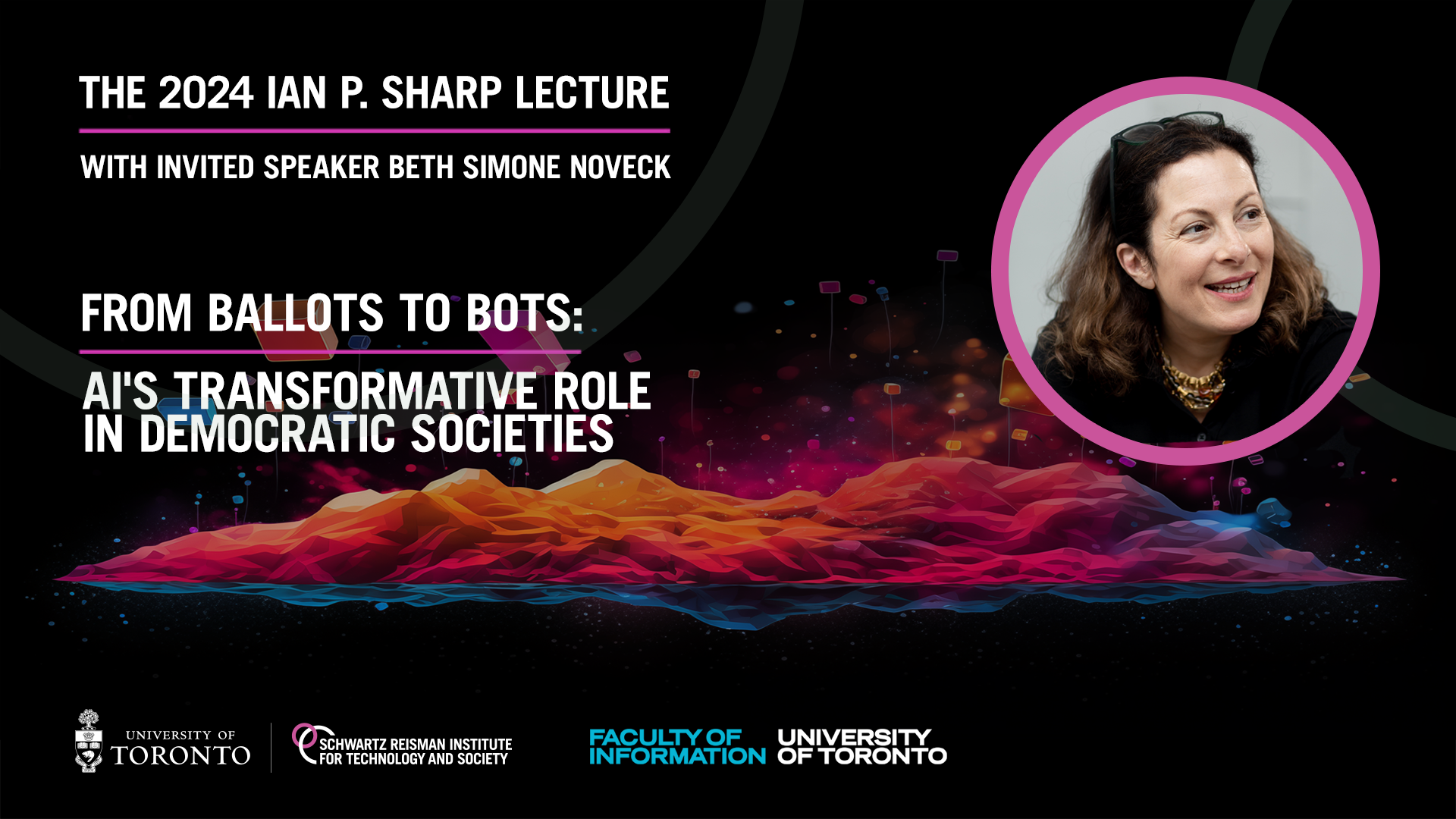
The 2024 Ian P. Sharp Lecture: Beth Simone Noveck, “From ballots to bots: AI’s transformative role in democratic societies”
The Ian P. Sharp Lectureship was established at the Faculty of Information Studies at the University of Toronto in 1989. It is intended to bring internationally renowned individuals to the campus to explore the transformative effects of information practice. The lectures, which are open to the profession and members of the public, are delivered every three to four years by a distinguished figure in information science and related fields.
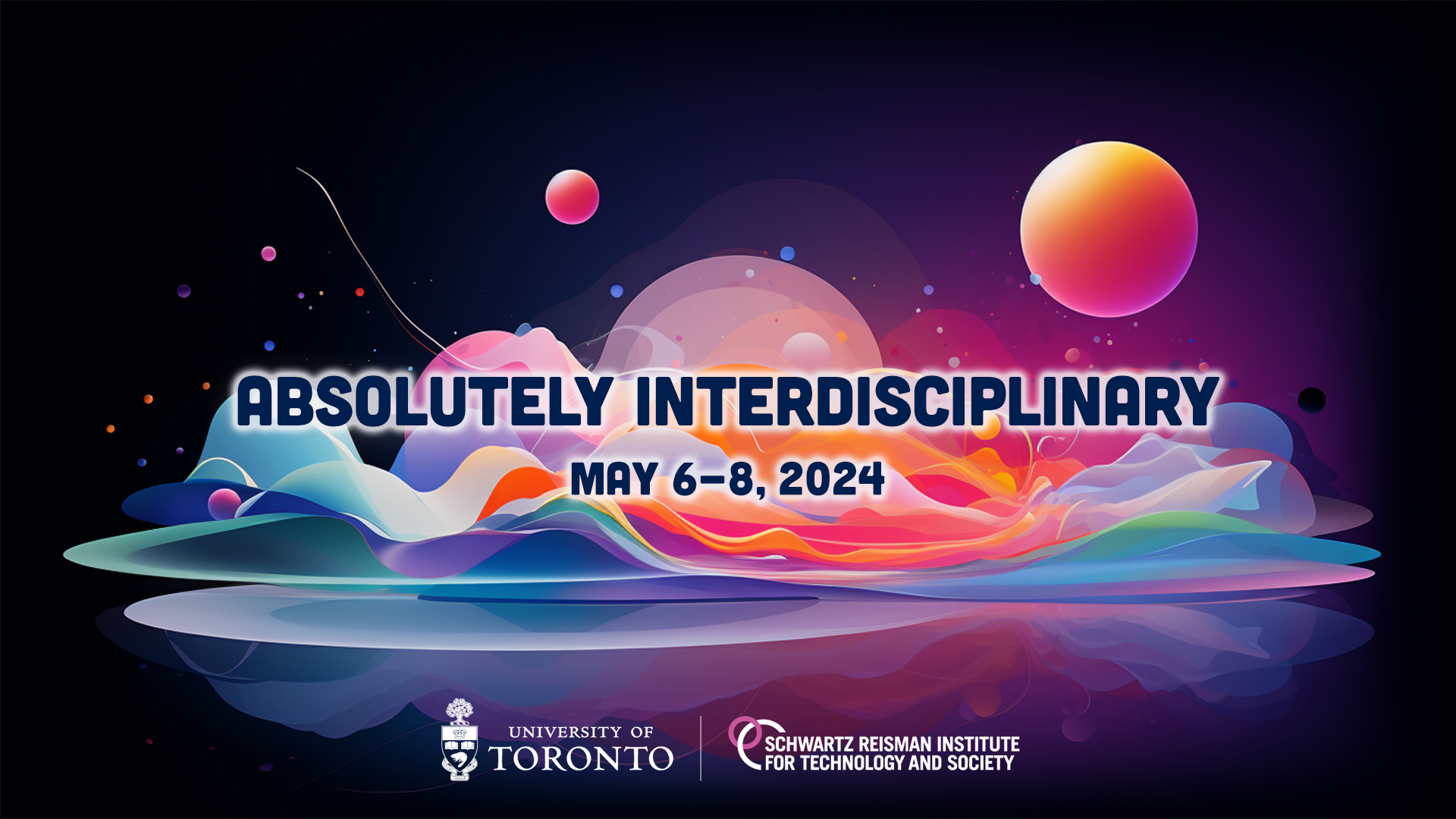
Absolutely Interdisciplinary 2024
SRI’s annual academic conference takes place May 6-8, 2024. Connecting technical researchers, social scientists, and humanists, Absolutely Interdisciplinary fosters new ways of thinking about the challenges presented by artificial intelligence and other powerful data-driven technologies to build a future that promotes human well-being—for everyone.
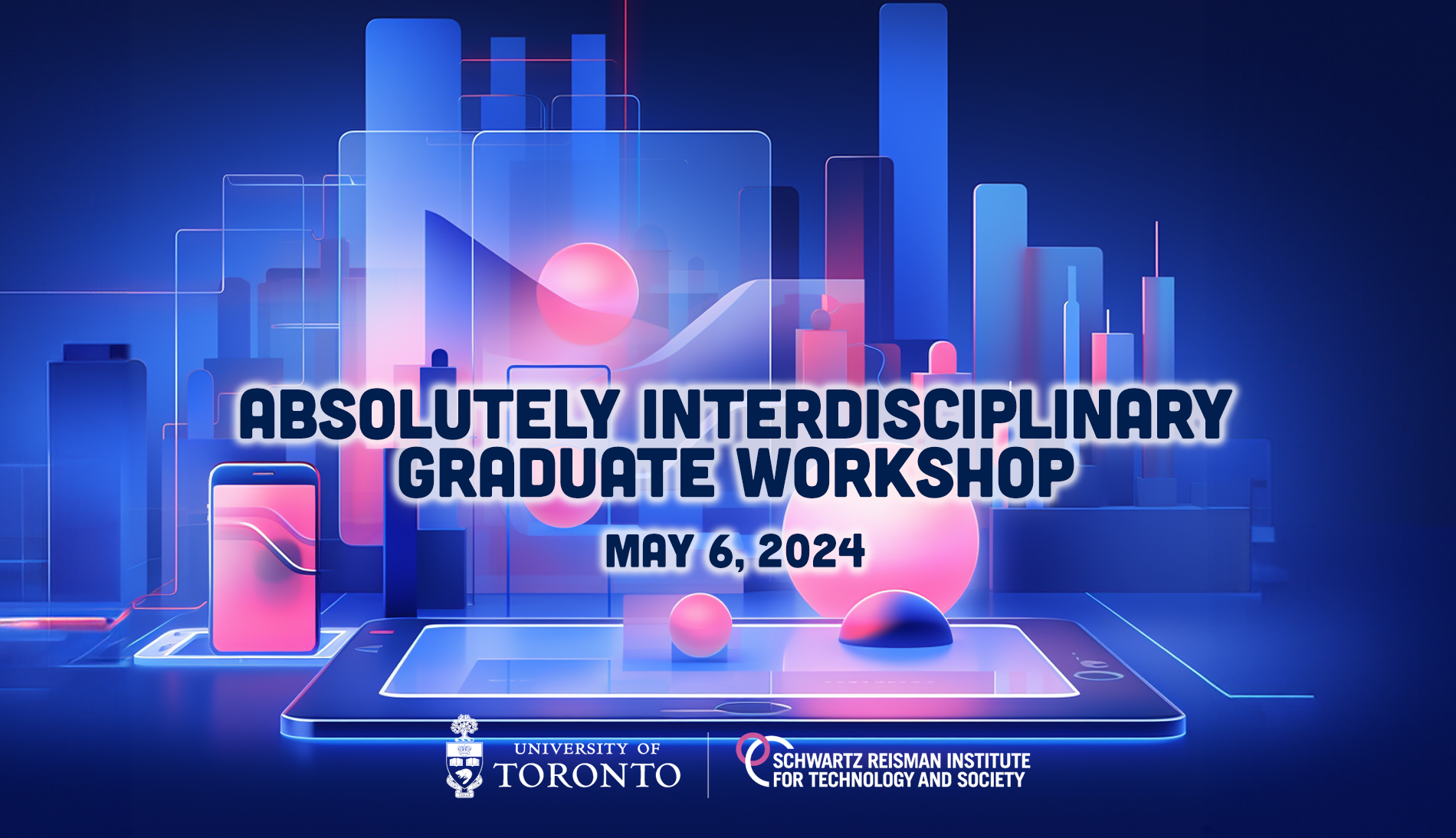
SRI Graduate Workshop: Interdisciplinary Dialogues on AI
The Schwartz Reisman Institute for Technology and Society’s 2023–24 cohort of graduate fellows present “Interdisciplinary Dialogues on AI,” a special one-day workshop that will explore innovative solutions for tough problems at the intersection of technology and society.
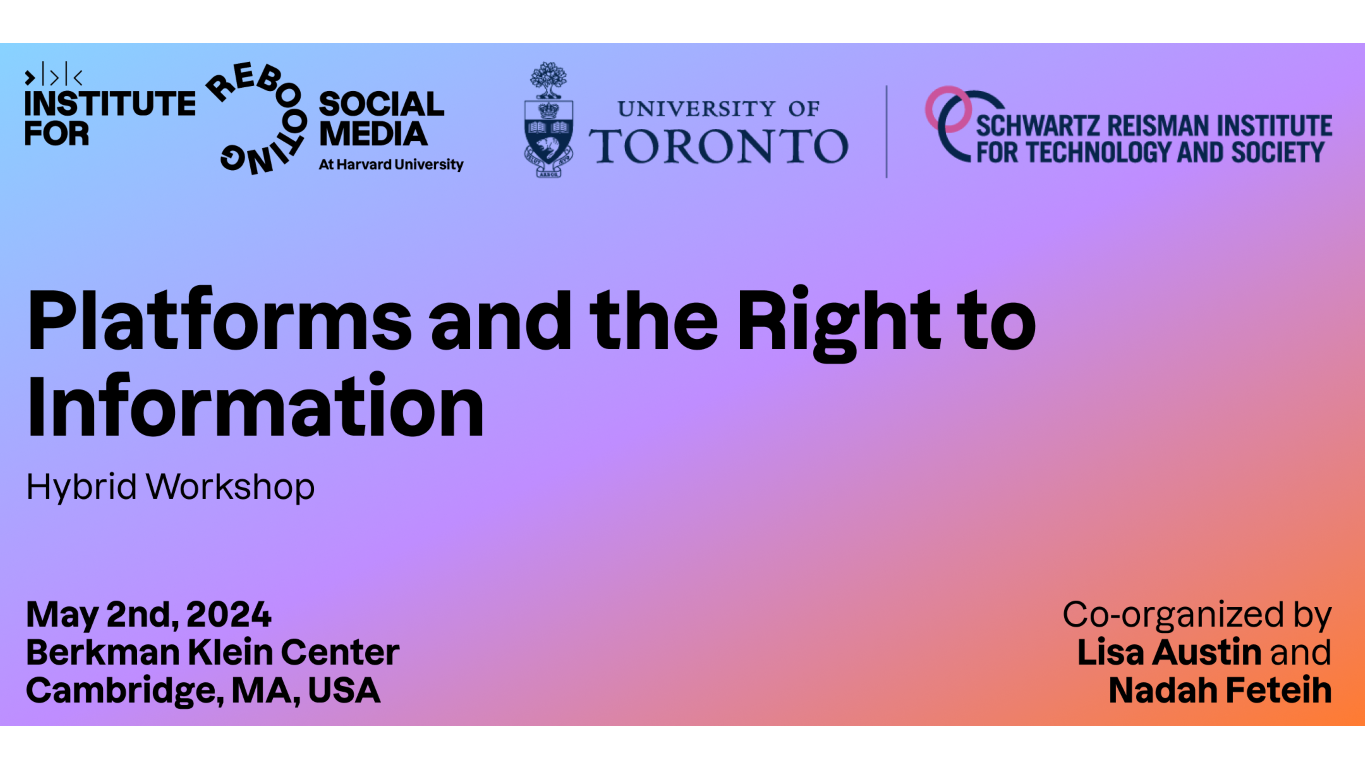
Special event: Platforms and the right to information
What kinds of claims can we make to access platform data? How can we ensure that the digital world can be independently knowable and interrogated and that this ability is equitably distributed? How do these questions fit within a broader set of concerns regarding the social and democratic value of data, data colonialism, data justice, and epistemic justice? This hybrid workshop brings together a diverse and interdisciplinary group of scholars and practitioners to discuss these and related questions.

SRI Seminar Series: Luciano Floridi, “What is the impact of AI on democracy?”
Luciano Floridi is the founding director of the Digital Ethics Center at Yale University, where he is also a professor in the Cognitive Science Program. World-renowned as one of the most authoritative voices of contemporary philosophy, Floridi is a founding figure within the philosophy of information and one of the major interpreters of the digital revolution. He is deeply engaged with policy initiatives on the socio-ethical value and implications of digital technologies and collaborates closely on these topics with many governments and companies worldwide.
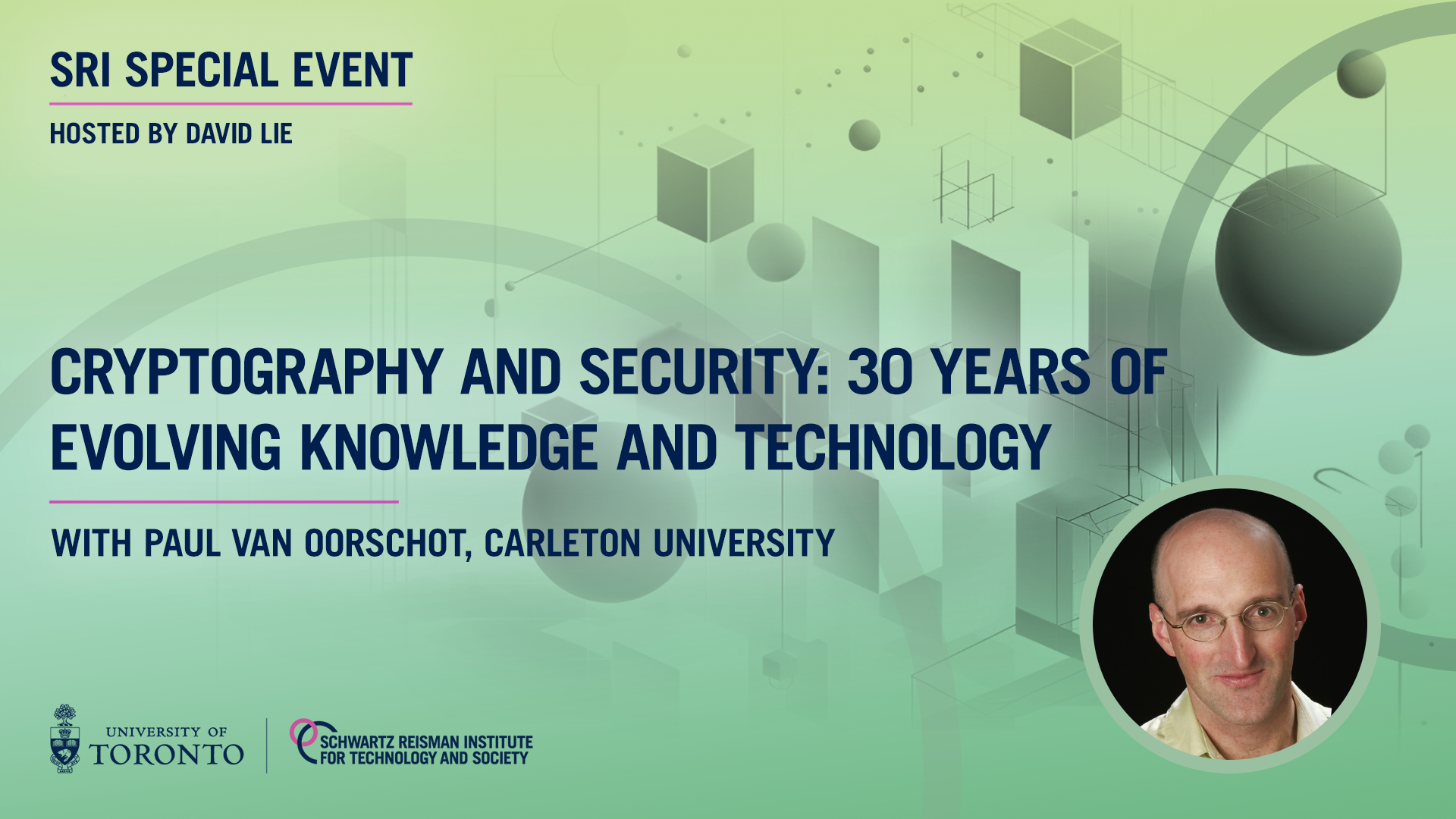
Special event: Cryptography and security: 30 years of evolving knowledge and technology
The internet essentially began 30 years ago, with the 1994 release of Netscape Navigator. Cryptography and security then transitioned from the fringes of university research and a niche industry sector to major subject areas and technologies underpinning essential components of modern society.
SRI Research Lead David Lie welcomes Paul Van Oorschot, professor of computer science at Carleton University, for a talk taking us through selected highlights along this journey.
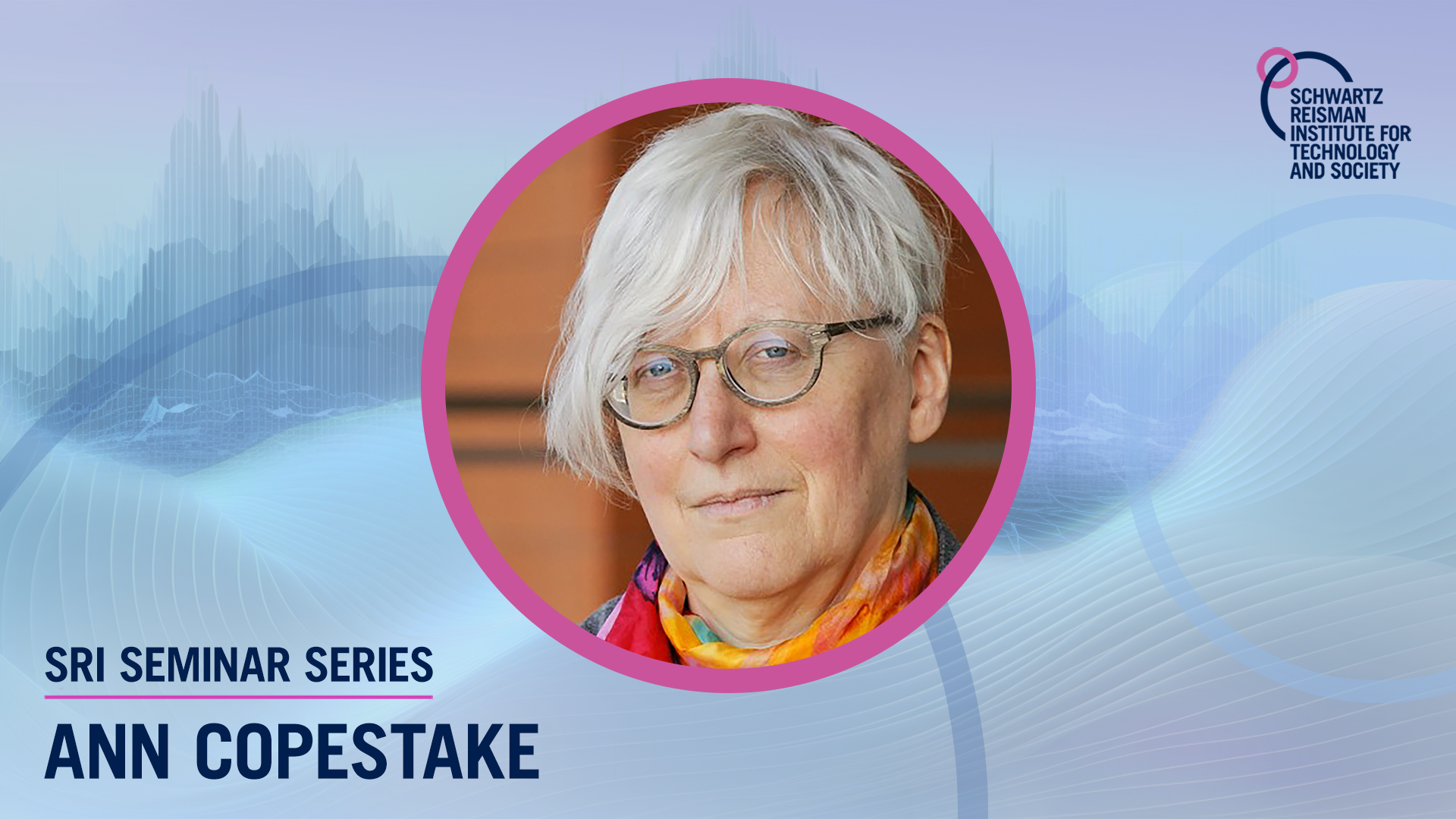
SRI Seminar Series: Ann Copestake, “LLMs and the Information Layer"
Ann Copestake is a professor of computational linguistics at the Department of Computer Science and Technology at the University of Cambridge. Her research involves developing computer models of human languages, including explores the development of semantic models compatible with broad-coverage computational processing, and establishing the performance of deep learning systems according to linguistic criteria.

SRI Seminar Series: Iason Gabriel, “The ethics of advanced AI assistants”
Iason Gabriel is a staff research scientist at Google DeepMind whose work focuses on the ethics of artificial intelligence, including questions about AI value alignment, distributive justice, language ethics and human rights. Gabriel has contributed to several projects that promote responsible innovation in AI, including the creation of the ethics review process at NeurIPS.

Special event: Ted Chiang, “Thoughts on being a cyborg”
To better understand how new information technologies might shape the way we think, let's think about how the oldest ones have made themselves part of us. Join acclaimed author Ted Chiang and SRI Faculty Fellow Avery Slater (Department of English, University of Toronto) for a talk on the impacts of technologies on the human experience.

SRI Seminar Series: Marlène Koffi, “Unlocking innovation: The use of natural language processing to uncover scientific bias”
Marlène Koffi is an assistant professor in economics at the University of Toronto, and a faculty affiliate at the National Bureau of Economics Research and the Schwartz Reisman Institute for Technology and Society. Koffi’s research interests are in the economics of innovation and science, and she is also interested in applying deep learning and artificial intelligence techniques for economics studies and public policies.

SRI Seminar Series: Rohan Alexander, “Improving reproducibility in quantitative social sciences: A simulation-based workflow enhanced with large language models”
Rohan Alexander is an assistant professor at the University of Toronto, jointly appointed in the Faculty of Information and the Department of Statistical Sciences, assistant director of CANSSI Ontario, a faculty affiliate at the Schwartz Reisman Institute, and a co-lead of the Data Sciences Institute’s Thematic Program in Reproducibility. Alexander’s research investigates how to develop workflows that improve the trustworthiness of data science.

SRI Seminar Series: Vincent Conitzer, “Social choice and game theory for AI alignment”
Vincent Conitzer is a professor of computer science at Carnegie Mellon University where he directs the Foundations of Cooperative AI Lab, head of technical AI engagement at the Institute for Ethics in AI, and a professor of computer science and philosophy at the University of Oxford. Conitzer works on artificial intelligence, including the intersections between AI and game theory, and AI and ethics, and explores how to determine the objectives AI systems should pursue.

SRI Seminar Series: Jon Kleinberg, “The challenge of understanding what users want: Inconsistent preferences and engagement optimization”
Jon Kleinberg is a professor of computer science at Cornell University whose research focuses on issues at the interface of networks and information, with an emphasis on the social and information networks that underpin the web and other online media. In this talk, Kleinberg proposes a new method for optimizing user experience on online platforms based on an insight that users have inconsistent preferences, exploring new insights for interactions between design, behavioral science, and social media.

Special event: Nathalie Smuha in conversation with Abdi Aidid on algorithmic decision-making in the judiciary
Increasingly, algorithms are being used in legal processes from case analysis to sentencing recommendations and beyond. In this special in-person event, SRI Research Lead Anna Su will host a conversation between Nathalie Smuha, a legal scholar and philosopher at the KU Leuven Faculty of Law and Criminology, and Abdi Aidid, assistant professor at the University of Toronto’s Faculty of Law on the topic of algorithmic decision-making in the judiciary.

SRI Seminar Series: Norman Sadeh, “Privacy in the age of AI and the Internet of Things”
Norman Sadeh is a professor in the School of Computer Science at Carnegie Mellon University, director of CMU’s Mobile Commerce Laboratory and its e-Supply Chain Management Laboratory, and co-director of the MSIT Program in Privacy Engineering. In this talk, he will present his recent research exploring how to overcome privacy challenges associated with contemporary data collection practices, and will describe some practical solutions aimed at empowering people to regain control over their data.
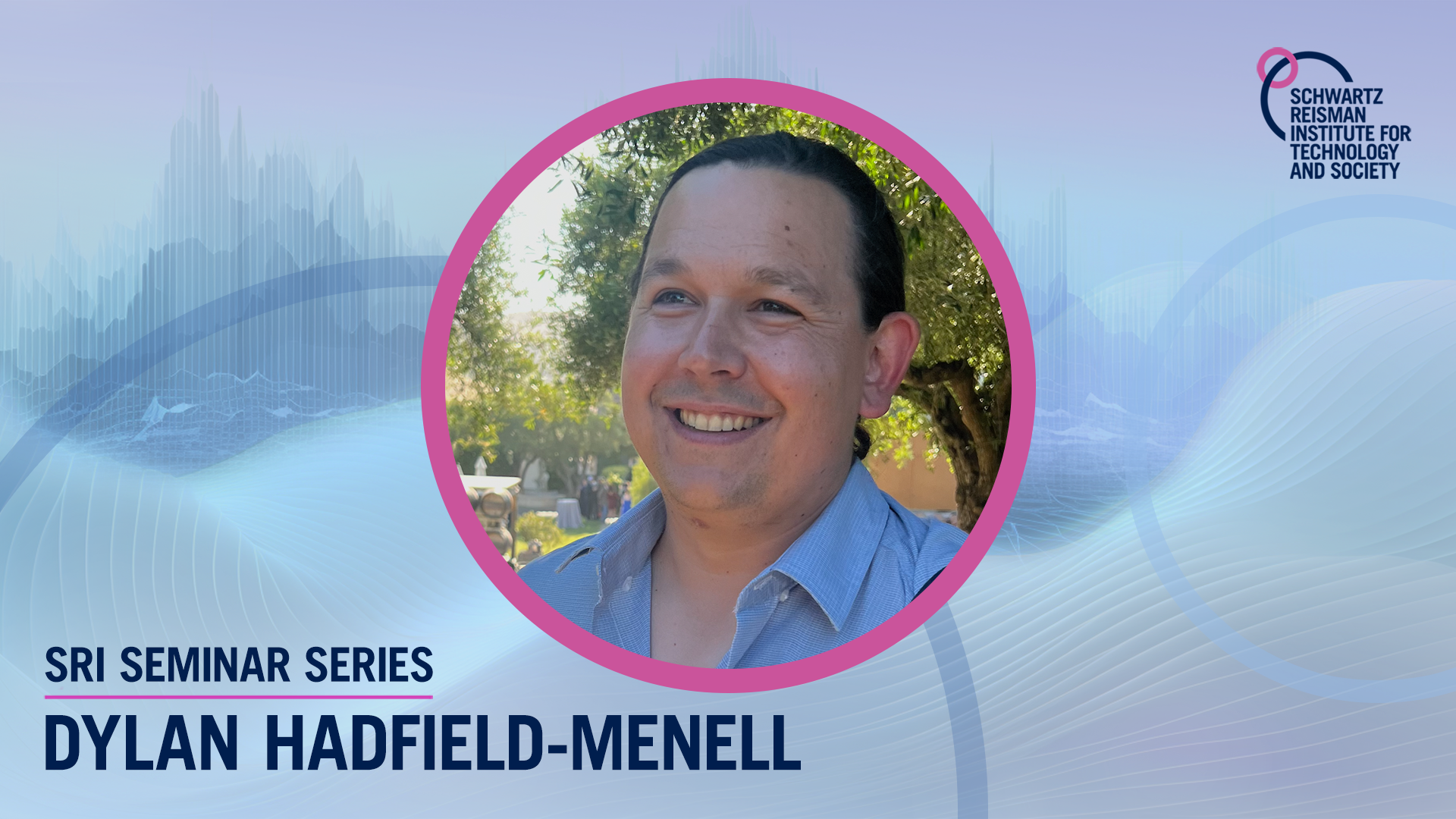
SRI Seminar Series: Dylan Hadfield-Menell, “You can’t have AI safety without inclusion”
Dylan Hadfield-Menell is an assistant professor at MIT’s Department of Electrical Engineering and Computer Science, and runs the Algorithmic Alignment Group in the Computer Science and Artificial Intelligence Laboratory (CSAIL) at MIT. His research works to identify solutions to alignment problems that arise from groups of AI systems, principal-agent pairs such as human-robot teams, and societal oversight of machine learning systems.

SRI Seminar Series: Lynette H. Ong, “Authoritarian statecraft in the digital age”
Lynette H. Ong is a professor in the Department of Political Science and the Munk School of Global Affairs & Public Policy at the University of Toronto and the director of the Munk School China Initiative. Her research interests lie at the intersection of authoritarianism, contentious politics, and development. In this talk, she will examine how digital technologies have enabled new forms of control for autocratic governments to co-opt and repress dissent.

SRI Seminar Series: Elizabeth Joh, “Computational research for equity in the legal system training program”
Elizabeth Joh is the Martin Luther King Jr. Professor of Law at UC Davis School of Law, and a leading expert on policing, privacy, and technology. In this talk, Joh will examine how advanced surveillance technologies used by modern police forces create new forms of knowledge that expand the capacities of policing, arguing that we must understand these new tools as “experiments on communities.”

SRI Seminar Series: Pinar Yildirim, “Automation, career values, and political preferences”
Pinar Yildirim is an associate professor of marketing at the Wharton School and associate professor of economics at the University of Pennsylvania who studies media, technology, and information economics, with a focus on the applied economics of online platforms, and effects of technology and AI. In this talk, Yildirim will explore how automation has impacted the US labour market, demonstrating that robotization is contributing to a loss of average local labour market career values, and that these changes have repercussions for investment in public infrastructure and political affiliations.

